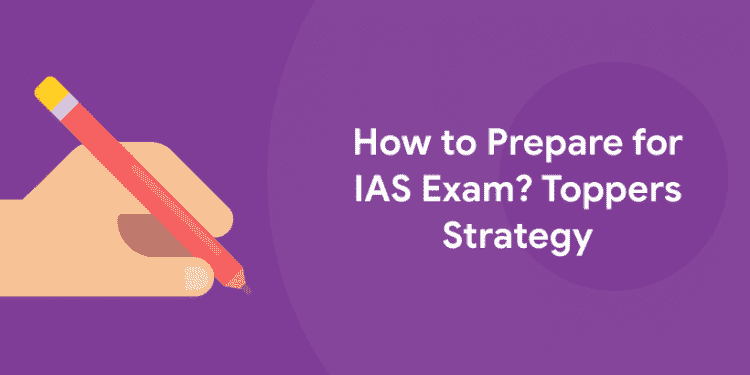Table of Contents
This UPSC Online page is a resource and information repository for the IAS exam 2020. With the increase in internet penetration in India, there is a manifold increase in online coachings, test series and availability of online UPSC books. The Union Public Service Commission (UPSC) has also shifted to an online application and registration process for the various exams under its purview. The official site upsconline.nic.in is the hub for the UPSC exam form, admit card and related information. Now, UPSC only issues the admit cards online, 2-3 weeks before the date of the exam. In this blog we will discuss about Toppers Strategy.
Annually, the UPSC conducts several exams such as NDA, IES, CDS, CAPF etc., including the most prestigious and competitive exam in India, i.e. the IAS exam. Officially the IAS exam is known as the Civil Services Exam which is conducted in three stages – Prelims, Mains and Interview.
The first stage of the IAS exam is the Prelims. IAS Prelims exam is an offline (pen-paper) exam which comprises two papers (objective type questions/MCQs). The candidates who will register on the official UPSC website successfully will be issued Admit Cards for IAS exam (Prelims) in about three weeks before the date of the exam. Candidates have to download the same from the UPSC official website. The admit cards will not be sent by post.
There is no sure shot formula to crack the civil services exams conducted by the UPSC – one of the toughest competitive exams in the country. Lakhs of contenders write the prelims and only a few hundred are finally appointed as civil servants. The numbers reveal that cracking the IAS exam requires a specialised approach to preparation. This article compiles ten handy tips to clear the civil services exam as disclosed by previous IAS toppers themselves. This article gives you toppers’ tips on how to clear the UPSC exam. So read on and get inspired!
Crack UPSC Exam with Expert Mentors! Get Free Demo Classes!
Toppers Strategy
List of Strategies tried and test from IAS Toppers
1: Which one of the following is not a Harappan site?
Step-1) When is the right time to start UPSC preparation
Most toppers give themselves at least a year to prepare for the UPSC exams. The syllabus to be covered is mammoth and it requires time to acquire a comprehensive understanding of the topics involved.
Step-2) Which optional subject to choose for UPSC Exam
You might be really motivated to study and put in extra-long hours when you start your IAS preparation, but would you be able to remain as motivated half-way through or until the very end? So, it is essential to choose subjects that you are genuinely interested in so that you are enthused about learning more about the topics. To become an IAS these expert IAS preparation Tips are very necessary for Toppers Strategy.
Points to keep in mind on how to select an optional:
- Narrow the entire list of optional subjects into a maximum of 3 – 4 subjects which you can pursue.
- Go through the syllabus of those shortlisted subjects.
- Evaluate your own academic background and knowledge levels.
- Check your interests in the subjects.
- Weigh the pros and cons of each subject.
- Choose one subject.
Step-3) How to make important notes for IAS Exam
Most IAS toppers swear by this technique of studying. Writing reinforces what you have learned and also helps you organise your learning content. This makes recollection easier. If you find it difficult to make notes from newspapers, you can refer to our daily current affairs which is updated regularly. This gives the best analysis of the daily news for UPSC, and also gives sample UPSC prelims and mains questions.
Step-4): To find the correct way to structure your writing answers for UPSC
Wherever possible, include diagrams, flowcharts, etc. to enhance your answers. They reveal a clear understanding of the concept and would fetch you more marks. Presentation is most important. Getting marks in the exam is about first impressions, so, keep it neat, simple, readable and compact.
Step-5)Always follow NCERT books for UPSC
There are multiple sources of study material for UPSC exams but your basic reading should ideally start with NCERT text books. The concepts are explained in simple language. It is recommended to read NCERT books from class VI to class XII for all the relevant subjects.
Step-6)Should we read Newspapers for UPSC?
If you are an aspiring civil servant, you should know that reading newspapers are an indispensable part of your civil services exam preparation. Almost all toppers recommend reading The Hindu and The Indian Express to be included as part of your daily routine is important keeping in mind Toppers Strategy.
Follow our daily news analysis and news analysis video that are updated every day, giving you the important news items dissected and explained in the most lucid manner for the UPSC exam.
Step-7) Attempt many UPSC Mock Test series
No preparation for the UPSC exams is complete without taking mock tests of the prelims and the mains. They serve the twin purposes of giving you a fair idea of what questions to expect and also helps you time your writing.
Step-8) Stay Fit and healthy
A healthy body fuels an active mind. Apart from intense studying you should also eat right, sleep well, and get enough exercise that will keep you going to crack the civil services exams.
Step-9) Always stay motivated
Finally, have a never say die attitude. Never lose sight of your goal. A lot of successful IAS toppers got through in their third and fourth attempts. And it is worth waiting and trying again till you succeed. In the words of American civil rights champion Jesse Jackson, ‘If you fall behind, run faster. Never give up, never surrender, and rise up against the odds.’
Toppers Tips
1. Understand the UPSC Syllabus & Exam Pattern Thoroughly
-
Download and print the syllabus (Prelims + Mains)
-
Break it down topic-wise and stick it on your wall or study desk
-
Align your resources strictly to the syllabus — No extra clutter!
Topper Tip: “UPSC doesn’t test knowledge, it tests relevance. Keep your study focused on the syllabus.” – Tina Dabi (AIR 1, 2015)
2. Start with NCERT Books
-
Begin with NCERTs from Class 6–12 for subjects like History, Geography, Polity, Economics, and Science
-
Build a strong conceptual foundation
-
Make crisp notes or mark important points
Topper Tip: “Don’t jump to big books until you’re clear with the basics.” – Anudeep Durishetty (AIR 1, 2017)
3. Choose the Right Optional Subject
-
Choose based on interest, background, and availability of materials
-
Read basic books of 2–3 subjects before finalizing
-
Practice writing answers for optional as early as possible
Topper Tip: “I chose Anthropology because of my interest and compact syllabus.” – Gaurav Aggarwal (AIR 1, 2013)
4. Read Newspapers Daily for Current Affairs
-
Follow The Hindu or Indian Express
-
Maintain a daily current affairs notebook
-
Focus on issues, not events
-
Supplement with monthly magazines (Vision IAS, Insights, etc.)
Topper Tip: “Link current affairs with GS syllabus for maximum impact.” – Srushti Deshmukh (AIR 5, 2018)
5. Make a Time-Bound Study Plan
-
Follow a daily/weekly target system
-
Reserve 8–10 hours a day for serious study
-
Include breaks and revision in your plan
Topper Tip: “Consistency is more important than long hours. Even 6 good hours daily can help.” – Kanishak Kataria (AIR 1, 2018)
6. Answer Writing Practice (Mains)
-
Start writing answers once GS basics are covered
-
Practice 1–2 questions daily (GS + Optional)
-
Join a test series after Mains syllabus completion
-
Use introduction-body-conclusion (IBC) structure
Topper Tip: “Good content is important, but presentation and structure make the real difference.” – Saumya Sharma (AIR 9, 2017)
7. Take Mock Tests (Prelims + Mains)
-
Attempt full-length tests regularly
-
Analyze mistakes and improve
-
Learn elimination techniques for MCQs
-
For Mains, get answer copies evaluated
Topper Tip: “Mock tests helped me with time management and identifying weak areas.” – Junaid Ahmad (AIR 3, 2018)
8. Revise Regularly
-
Stick to a 3–4 revision cycle before exams
-
Make short notes for quick revisions
-
Revise static + current affairs together
Topper Tip: “Revision converts knowledge into marks.” – IAS topper mantra
9. Focus on CSAT & Essay Paper
-
CSAT is qualifying but needs practice — especially comprehension & math
-
Essay requires original thinking + structured writing
Topper Tip: “I wrote one essay every Sunday. Feedback helped me improve fast.” – Topper strategy
10. Prepare for Interview Side-by-Side
-
Keep updating your DAF-based knowledge
-
Practice mock interviews with mentors
-
Read opinion columns and government schemes
✅ Final Tips from Toppers
-
Stick to limited sources, revise more
-
Avoid social media distractions
-
Take care of mental and physical health
-
Stay motivated with topper talks and peer groups
-
Never compare your journey with others
Ace your preparation. That is where Entri comes in. It helps you to prepare effectively for your Exam. We hope this blog on Toppers Strategy has given you an idea on how to go about your preparation.
That will be all from our end at Entri, hope you have benefited from our mock tests and study materials. Entri wishes you all the best for your upcoming examinations. Start your Preparation today itself.
Crack UPSC Exam with Expert Mentors! Get Free Demo Classes!
Frequently Asked Questions
What is the first step to start IAS exam preparation?
Begin by thoroughly understanding the UPSC syllabus and exam pattern. Download and analyze previous year question papers to get an idea of what to expect
Should I join a coaching institute for IAS preparation?
Coaching is not mandatory. Many toppers clear UPSC without coaching by using online resources, self-study, and structured planning.
How do toppers make notes for IAS?
Toppers make short, crisp, and revision-friendly notes:
-
Use bullet points and flowcharts
-
Keep separate notebooks for GS, optional, and current affairs
-
Update notes regularly with current developments










